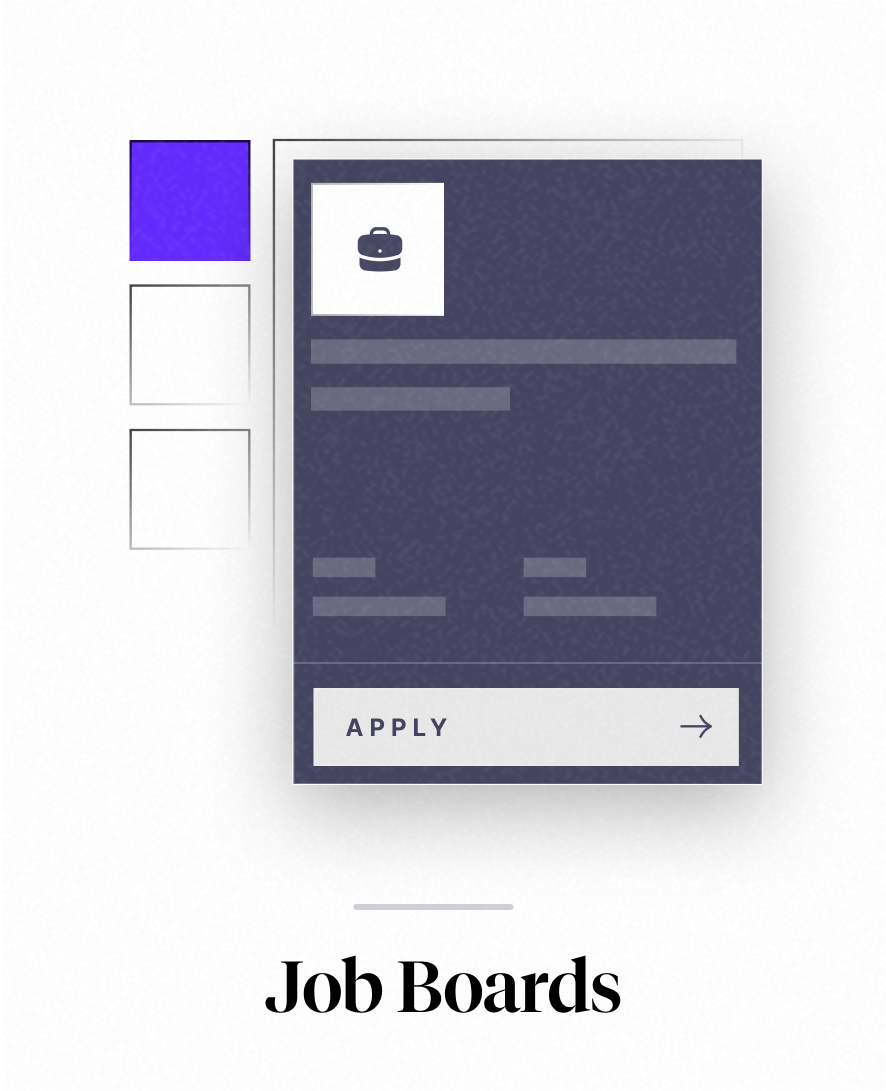Acquisition project | Mailchimp
I chose Mailchimp because I used it to send emails internally at my previous company. This versatile product has varied use cases for businesses of all sizes. I am especially focusing on drawing the acquisition framework for Mailchimp in India. I have interviewed people from GrowthX and a few from my LinkedIn network who use Mailchimp for their business to sketch out the ICPs and propose the acquisition plan that will help boost Mailchimp's efforts to convert businesses to their loyal subscribers.
What is Mailchimp?
Mailchimp is primarily email marketing software designed for businesses of all sizes. It is also transitioning to offer marketing and social media automation, adding value to businesses. Its most sought-after feature is the ability to design, categorize, and customize email audiences for targeted email marketing and to understand the reach of emails through analytics.
Features and Functionalities of Mailchimp
- Email marketing platform: Convert more customers with a powerful and intuitive platform; Create personalized emails, target precisely with behavioral-based automation and segments, and optimize with real-time reporting.
- Best-in-classThe #1 AI-powered email marketing and automation platform that recommends ways to get more opens, clicks, and sales.
- Personalize your marketing at scale: Reach more customers with less effort. Mailchimp’s automation helps users engage their audience at the right time, with the right message, and without manual intervention.
- Generate ROI with advanced segmentation: Mailchimp's powerful segmentation logic and filters help users relevant and timely communication to target the customers most likely to purchase.
- Create effective marketing campaigns with ease using intuitive design tools.
- Let AI help you write the first draft: Intuit Assist helps users quickly craft relevant content like headlines and body copy. It can even create fully built emails—all they need to do is review, edit, and publish.
- Create branded content at scale with Creative Assistant: Mailchimp's AI-powered design tools help engage audiences across touchpoints with professional logos and other assets via users' imported brand kit.
- Drive sales with AI-powered product recommendations: Use preset feeds like best sellers or new arrivals to send personalized emails with dynamic recommendations based on your customer interactions.
- Creative stunning emails faster by choosing from 130+ high-quality templates: Pick and personalize the design that’s just right. Choose a template that fits your industry and unique business goals to see the difference a great layout can make.
- Make smarter decisions based on personalized benchmarking:
- Stay connected to the apps and services by making Mailchimp the single source of truth for marketing activities. They offer 300+ integrations, so users have everything they need in a single location.
- Sell more by Tracking, analyzing, and optimizing impact: With an omnichannel dashboard, audience analytics, testing, and more, users can see what's working and make informed decisions.
- Get up and running easily with personalized onboarding services by getting guided support from an onboarding specialist—available with a Standard or Premium plan.
- 24/7 customer service
Mailchimp Pricing plan
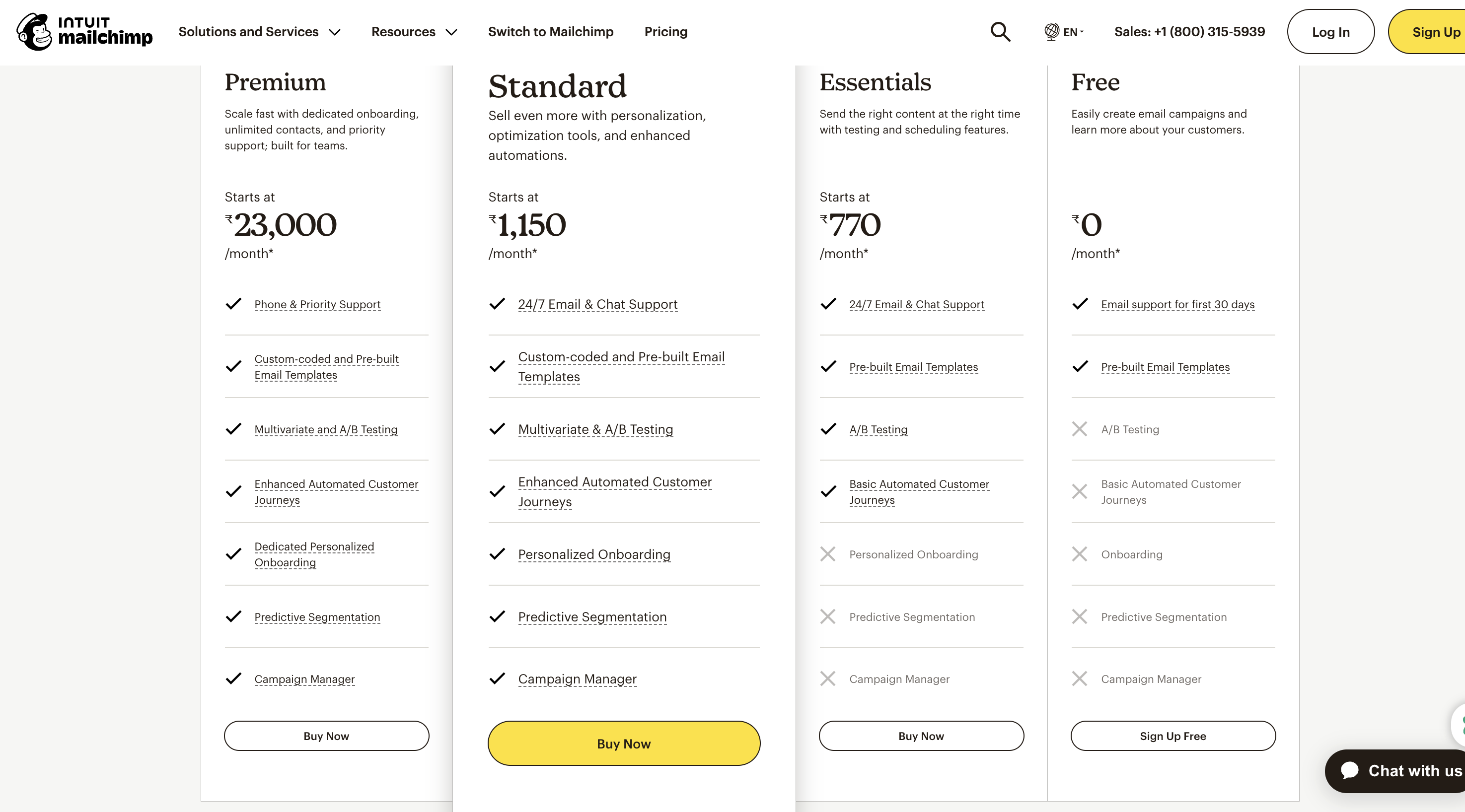
Ben Chestnut and Dan Kurzius designed Mailchimp as an alternative to the oversized, expensive email software of the early 2000s. Back then, it offered small business owners access to the same digital marketing advantages that their much larger competitors enjoyed, powering their success and enabling them to grow. In 2021, Intuit acquired Mailchimp. Over the years, Mailchimp has evolved as an innovative product, making it convenient for all companies to scale and grow as they need. Today, Mailchimp is an email and marketing automation platform for growing businesses. We empower millions of customers worldwide to start and grow their businesses with world-class marketing technology, award-winning customer support, and inspiring content. Mailchimp puts data-backed recommendations at the heart of your marketing so you can find and engage customers across email, social media, landing pages, and advertising—automatically and with the power of AI.
PMF stage: Rocket Science Group introduced an email software tool with a $20 monthly subscription fee. They prioritized customer feedback and adjusted the software, making it easier and more flexible for customers to create attractive emails. This approach helped them enhance their product, earn customers' trust, and boost revenue.
Early scaling stage: Mailchimp then introduced the freemium option in 2009. Within a year, its user base had grown from 85,000 to 450,000. By June 2014, it was sending over 10 billion emails per month on behalf of its users. They started marketing Mailchimp early by identifying the right marketing channels. Not able to spend money on hefty Google Ads (they used to cost per impression and not per click at the time) like their competitors, he used content marketing to rank higher and get leads. He kept a close eye on how the Google algorithm was evolving and even wrote a full PDF about email marketing when Google was indexing and giving higher ranking to PDFs – getting them first of their online customers.
They also chose a quirky name and a chimp as their brand mascot and ran a billboard campaign across the USA to create brand recall for their customers.
Mature Scaling - Mailchip was acquired by Intuit in 2021, which also owns Quickbooks. The journey ahead for the company is to power growth for small and medium businesses by playing a much more expansive role and thinking about it as a role in solving their growth problem. The business now is solving challenges for small businesses. The top challenge they have is getting new customers and growing existing customers. Mailchimp is now in the stage of how to power growth for businesses. Email is very important, but there’s much more to that equation than email, which Mailchimp aims to solve by marketing automation, where email is part of the process.
Marketing automation features include:
- Lead Management
- Email campaigns
- Templates
- Social Media Marketing
- Personalization
- Automation alters
- Workflow organization
Here's the flow on how it's aiming to solve this:
- Collect leads on your website
- Select a list to create a form from
- Sign-up forms to get a new audience, with an option to copy-paste this embedded form's code anywhere on the website.
For email marketing:
- Easy to create emails with pre-designed templates
- Customization emails sent from pre-verified email IDs
- Manage, build, and tweak email audience as needed per campaign
- Embed micro-surveys to understand the audience's pulse on a specific topic and initiate two-way communication with the audience.
- Automate drip email
- The first email is sent after a subscriber joins.
- The second email is sent after the subscriber follows your cue and clicks a specific link
- Customize these emails to leads who qualify
Build relationships with customers:
- Send customers your latest content, promotions, latest launches, announcements
- Educate and build awareness of your product/service and related environment to give context.
- Give them timely updates on upcoming initiatives
- Get them to sign up and buy your products/services
- Create this continuous loop between customer and business
The objective for Mature scaling companies such as Mailchimp
- Understand the ICP
- Understand the core value proposition
- Create an executable strategy for a given acquisition budget
- For scaling existing channels using 80% of the budget
- For experimentation 20%
Particulars | ICP 1 | ICP 2 |
|---|---|---|
Company Type | Sekel Tech | Emerging Women Movement |
Persona Position | Product Manager | Marketing Director |
Organization category | Hyperlocal Discovery and E-commerce Platform | Training |
Organizational goal | <50 | <20 |
Role priorities | User Interface and Revenue | Acquisition and Revenue |
Role in the buying process | Top of the funnel | Top of the funnel |
Reporting structure | Manager | CEO |
Preferred channels | Project Management | Email, Social media, |
Where do they spend time? | Gsuite, emails, surveys, user experience tools | Photoshop suite, Square space, free version of Mailchimp, Hootsuite, SEMrush |
Pain points |
|
templates
to be more dynamic
marketing automation -- Scheduling -- Social Media management |
Current solution | Mailchimp free or paid version depending on the client's needs | Hootsuite, SEM rush for marketing automation |
ICP prioritization insights:
- Companies with less than 50 people need email marketing automation solutions like Mailchimp for timely and personalized communications with their customers
- They also want to segment and categorize their audiences to share more targeted and relevant content
- The companies are looking for a solution that requires minimal technological resources and offers a host of built-in templates and solutions that they can easily customize and personalize
- Easier interface and less time to onboard
- They want extensive analytics and other reporting features to track the key metrics and improvise their campaigns based on user insights.
- They want to gamify the content by adding quizzes and polls, making it more fun and emoji-rich.
Total Addressable Market
Mailchimp is established as an email marketing tool. Now, the focus is to build the brand as a marketing automation tool for marketers of growing companies, especially for e-commerce and new internet businesses with fewer employees and resources for Mailchimp to get new customers, grow audience, targeted advertising, email marketing, and marketing automation.
Let's understand Mailchimp's market:
External research
- Global Email Marketing Market byMarketing 2030, growing at a CAGR of 16.58% from 2024 to 2030.
- Global Small Business Market - the size was valued at USD 119.35 billion in 2022 and is poised to grow from USD 129.49 billion in 2023 to USD 248.71 billion by 2031, growing at a CAGR of 8.5% in the forecast period (2024-2031)
- The Indian SME segment's current production value is almost Rs 816,000 crore. It contributes to around 40% of industrial production and exports and manufactures more than 8,000 diverse products, ranging from low-tech items to technologically advancedThe Global Email Marketing Market was valued at USD 7.01 billion in 2022 and is projected to reach USD 7.3 billion - current production value is almost Rs 816,000 crore products.
- Report Small Business Data Observatory 2023 - The Report Small Business Data Observatory 2023 found that 65 percent of Indian small businesses earned up to half of their revenue from online sales.
- Email Marketing. Market in India - Offers a high return on investment (ROI) for businesses in India, making it a valuable tool for driving revenue and growing their business. According to a report by Litmus, every $1 spent on email marketing generates an average return of $42.
- Global Marketing automation stats per this report -
- The marketing automation market was worth $4.79 billion in 2021. Experts expect its value to nearly triple to $13.71 billion by 2030. That’s a 12.9% CAGR.
- 76% of companies use marketing automation.
- 10% of customer journeys are fully automated.
- 91% of marketers say marketing automation helps them achieve their objectives.
- Automated emails generate 31% of all email orders.
- Marketers who use automation are 46% more likely to report having an effective marketing strategy.
- Indian e-commerce market—According to a report by Shopify, India's e-commerce market is also experiencing robust growth. Projections indicate that the market will reach $111 billion by 2024 and expand, ramp up their business, and achieve their - According to a report by Shopify, India's e-commerce market is also experiencing robust growth. The Projections indicate that the market will reach $111 billion by 2024 and $111 billion by 2024 to US$200 billion by 2026. The country's online retail market was valued at INR 4,822.80 billion in fiscal year (FY) 2023 and is anticipated to reach INR 15,159.11 billion by FY 2028.
- A Straits Research report states that developing countries like India and China have been experiencing strong demand for marketing automation software.
- According to this Mailchimp blog, by 2025, there will be 220 million internet shoppers in India, according to a Mordor Intelligence report. Similarly, the India Brand Equity Foundation predicts India's e-commerce market will reach $350 billion USD by 2030.
Target ICP
TAM
- Total Businesses MSME - 63.5 Million enterprises. (Source link)
- Let's assume that 20% of MSMEs are likely to adopt Email Marketing
TAM = Total MSME x Adoption rate
63,000,000×0.20
Total Addressable Market = 12,600,000 businesses
SAM
- Relevant industries: Let's assume 50% of TAM will likely use email marketing.
- Digital readiness: Let's assume that 80% of relevant industries are digitally ready for a product like Mailchimp.
SAM = 12,600,000×0.50×0.80
Serviceable Addressable Market =5,040,000 businesses
SOM
- Let's assume Mailchimp can capture 10% of SAM.
Serviceable Obtainable Market: 5040000 x 0.10 = 504000
Job to be done (JTBD)
Job | Goal |
|---|---|
Functional |
|
Personal |
|
Financial |
|
Social |
|
Acquisition Channels for Mailchimp
Channel name | Cost | Flexibility | Effort | Lead Time | Scale |
|---|---|---|---|---|---|
Organic content loop | Medium | Low | High | Medium | Low |
Influencer Marketing | High | High | HIgh | Medium | High |
Product Integrations | High | High | High | High | Medium |
Content Loops (YT, Blogs, SM) | Low | High | Low | Low | High |
Paid Ads | High | High | Low | Low | High |
As Mailchimp matures, we double down on the channels that are working for Mailchimp. I'm choosing Content Loops and using strategies to optimize LTV further and reduce CAC for Mailchimp.
Organic
Mailchimp is already a market leader in email marketing; the goal is to fulfill the existing search intent of the enterprise customer.
- YouTube channel: It has 61.8K subscribers and views per video from 50k to 6K
- LinkedIn: LinkedIn has over 198,000 followers.
- X: Mailchimp's main account on the platform has over 250,000 followers.
- Facebook: Mailchimp's page has around 494k followers.
- Mailchimp Blog: This blog has rich content focusing on different use cases of Mailchimp and educating the audience on how to ramp up their business and achieve their goals.
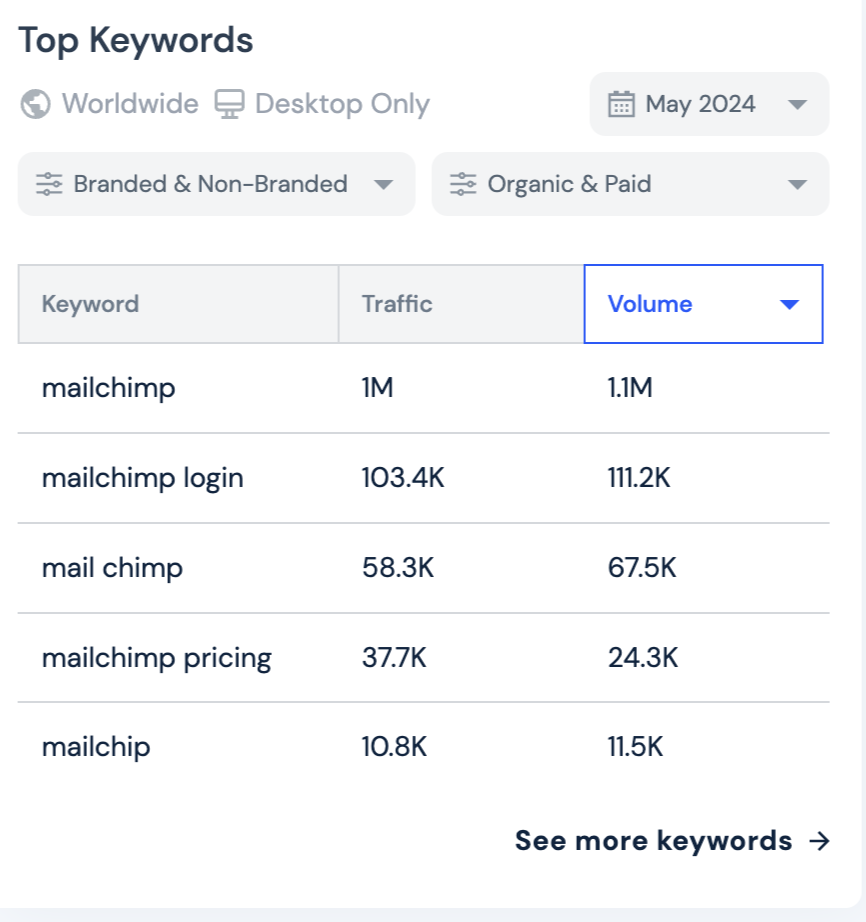
Types of search | Search queries |
|---|---|
Use case | Email marketing tools for the sales team |
Automated marketing tool for lead generation | |
Email marketing automation tools | |
Mailchimp brand | Free Mailchimp email |
Is Mailchimp worth the price? | |
Mailchimp reviews | |
Mailchimp for beginners | |
Competition | best email marketing automation channels |
Hubspot vs. Mailchimp | |
Hubspot trial version | |
Cost-effective alternatives for Mailchimp | |
Topic | How do you send free emails to a targeted audience? |
How can marketing emails not be marked as spam? | |
How do we automate emails? | |
How do you set up drip emails? |
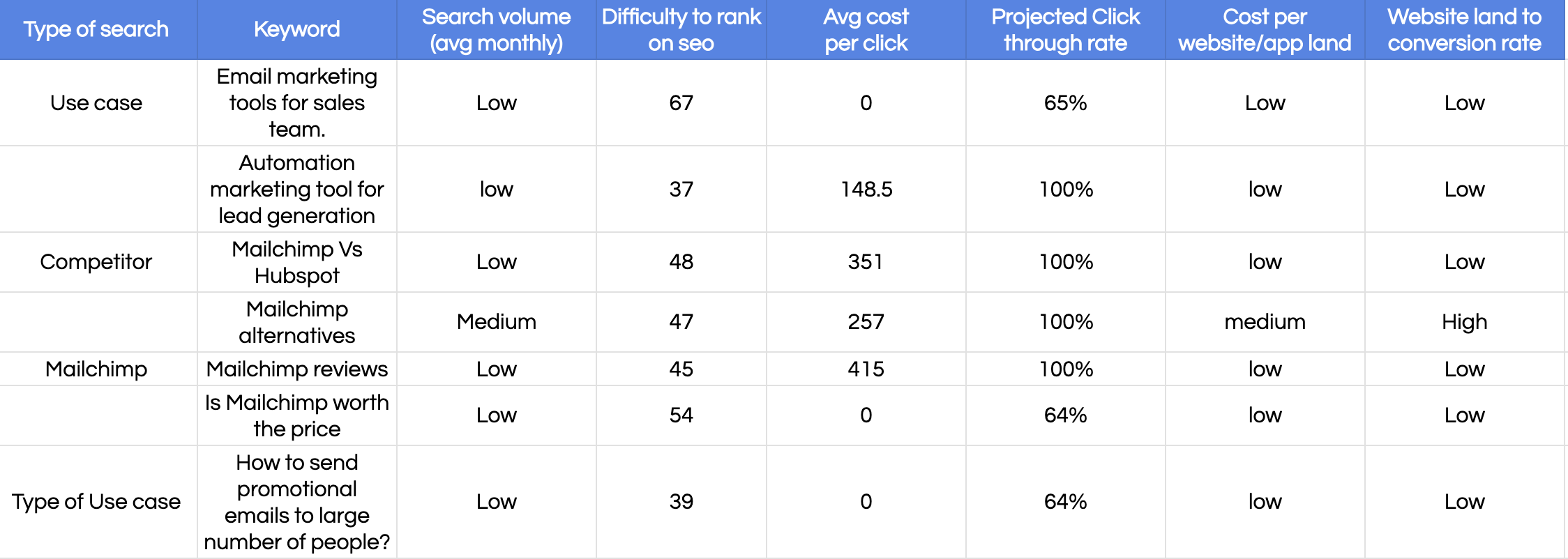
- The ICPs need to see more content around the above use cases to enhance visibility.
- Mailchimp has good keyword search results and brand value and recognition.
- The ICPs need more case studies; testimonials will increase visibility and intent to get a Mailchimp subscription.
Another channel Mailchimp can focus on is its YouTube channel. For new businesses, they can create videos and testimonials showing how Mailchimp can be integrated into their operations. They can also make playlists on Mailchimp ranging from beginner to pro levels, helping new users get started with the platform easily and advance to become experts quickly.
Additionally, Mailchimp can make short videos, especially for businesses, on the 300+ integrations it currently has and how businesses can integrate them to maximize their productivity at work. These videos can also be listed as a playlist on their YouTube channel and promoted via social media.
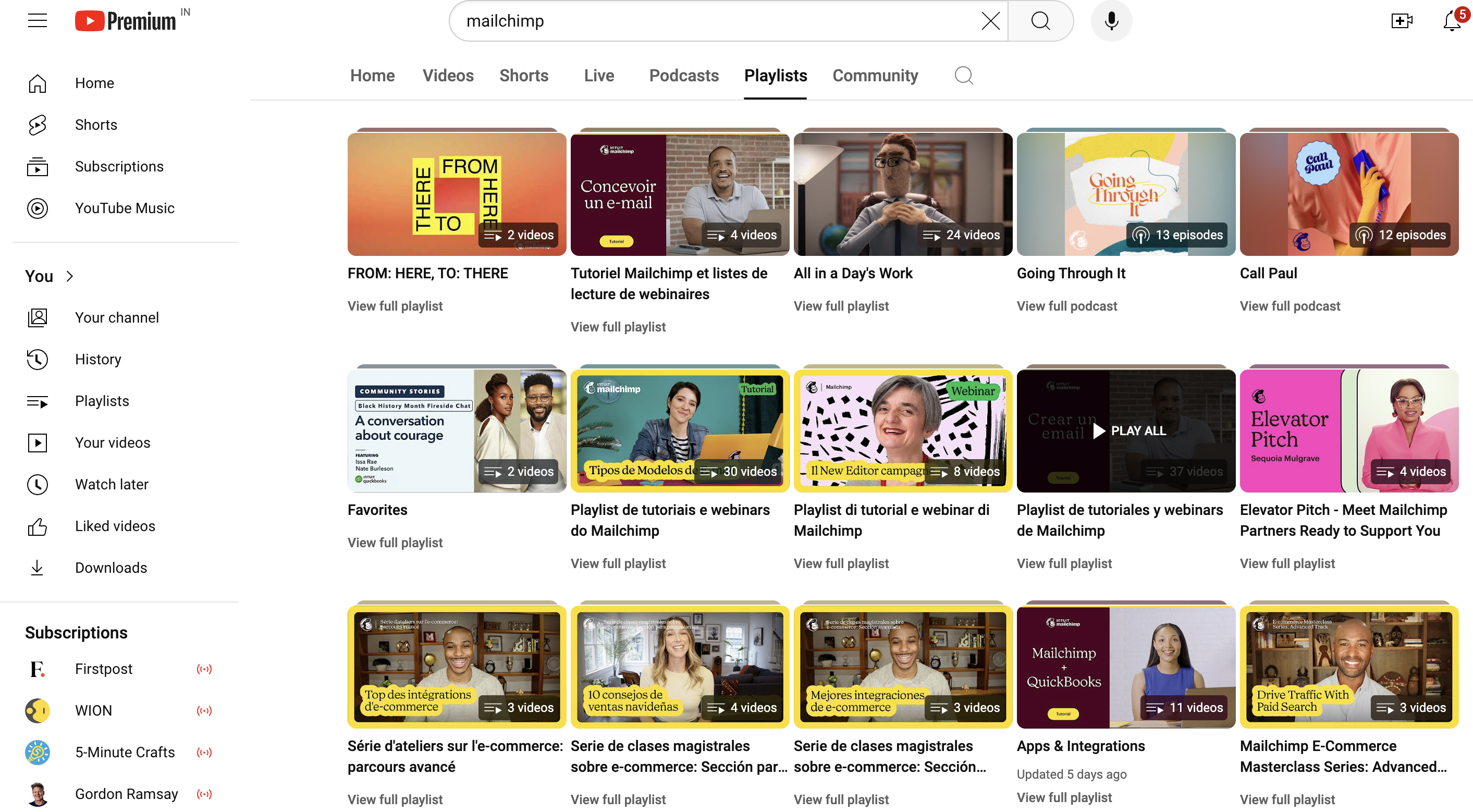
Content Loops:
Hook: Helping businesses learn more about email marketing automation and Mailchimp product integrations.
Creator: YouTube videos and blogs - Mailchimp team
Distributor: YouTube, Email, Mailchimp newsletter
How will the user share? When businesses come across YouTube videos while searching for email marketing or subscribe to the YouTube channel and share them with their peers at work.
Once businesses learn about the new features, they will visit the Mailchimp website and start their business journey.
Reducing CAC
Scenario Overview Objective
Reduce Mailchimp's Customer Acquisition Cost (CAC) by 20% in the next quarter.
Current CAC: $100 per new paying subscriber.
Target CAC: $80 per new paying subscriber.
- Improve Targeting and Segmentation Action: Use lookalike audiences on Facebook.
- Current Method: Mailchimp runs broad Facebook ads targeting all small businesses.
- New Method: Mailchimp uses its current customer data to create a lookalike audience on Facebook, focusing on businesses with high engagement and conversion rates.
- Result: Mailchimp's ads reach more relevant users by targeting a lookalike audience, increasing the conversion rate from 2% to 3%.
- Optimize Marketing Channels Action: Focus on SEO and content marketing.
- Current Method: Mailchimp spends $20,000 on PPC ads with a conversion rate of 2%.
- New Method: Mailchimp reallocates $10,000 to produce high-quality, SEO-optimized content, including blog posts, case studies, and tutorials.
- Result: Over the quarter, organic search traffic increased by 30%, and the content generated sustained traffic, reducing reliance on PPC.
- Leverage Data and Analytics Action:
- Implement A/B testing on landing pages.
- Current Method: Mailchimp has a single landing page with a conversion rate of 5%.
- New Method: Mailchimp conducts A/B testing on landing pages, experimenting with headlines, images, and CTAs.
- Result: The optimized landing page achieves a conversion rate of 7%, increasing the efficiency of ad spend.
- Enhance User Experience Action: Improve the onboarding process.
- Current Method: New users receive a generic welcome email.
- New method: New users receive a personalized onboarding sequence with tutorials, tips, and a direct link to customer support.
- Result: The improved onboarding process increases the trial-to-paid conversion rate from 15% to 20%.
- Increase Customer LTV:
- Implement upsell and cross-sell strategies.
- Current Method: Mailchimp offers only basic email marketing plans.
- New Method: Mailchimp introduces premium features like advanced analytics and automation, which are promoted through targeted email campaigns.
- Result: ARPU increases by 10%, allowing for more aggressive acquisition spending while maintaining profitability.
- Expand Partnerships and Integrations Action:
- Develop strategic partnerships.
- Current Method: Mailchimp relies solely on direct marketing.
- New Method: Mailchimp partners with a popular CRM tool, offering a bundled discount for new users who sign up for both services.
- Result: The partnership attracts a new audience segment and shares acquisition costs, effectively reducing Mailchimp’s CAC.
New CAC Calculation:
Current CAC: $100 Improved Conversion Rates and Efficiencies: Achieving a 20% overall improvement. Resulting CAC: $100 x 0.8 = $80 By systematically applying these strategies, Mailchimp successfully reduces its CAC from $100 to $80, achieving the target reduction while enhancing overall marketing and sales effectiveness.
Brand focused courses
Great brands aren't built on clicks. They're built on trust. Craft narratives that resonate, campaigns that stand out, and brands that last.
All courses
Master every lever of growth — from acquisition to retention, data to events. Pick a course, go deep, and apply it to your business right away.
Explore courses by GrowthX
Built by Leaders From Amazon, CRED, Zepto, Hindustan Unilever, Flipkart, paytm & more
Course
Advanced Growth Strategy
Core principles to distribution, user onboarding, retention & monetisation.
58 modules
21 hours
Course
Go to Market
Learn to implement lean, balanced & all out GTM strategies while getting stakeholder buy-in.
17 modules
1 hour
Course
Brand Led Growth
Design your brand wedge & implement it across every customer touchpoint.
15 modules
2 hours
Course
Event Led Growth
Design an end to end strategy to create events that drive revenue growth.
48 modules
1 hour
Course
Growth Model Design
Learn how to break down your North Star metric into actionable input levers and prioritise them.
9 modules
1 hour
Course
Building Growth Teams
Learn how to design your team blueprint, attract, hire & retain great talent
24 modules
1 hour
Course
Data Led Growth
Learn the science of RCA & experimentation design to drive real revenue impact.
12 modules
2 hours
Course
Email marketing
Learn how to set up email as a channel and build the 0 → 1 strategy for email marketing
12 modules
1 hour
Course
Partnership Led Growth
Design product integrations & channel partnerships to drive revenue impact.
27 modules
1 hour
Course
Tech for Growth
Learn to ship better products with engineering & take informed trade-offs.
14 modules
2 hours
Crack a new job or a promotion with ELEVATE
Designed for mid-senior & leadership roles across growth, product, marketing, strategy & business
Learning Resources
Browse 500+ case studies, articles & resources the learning resources that you won't find on the internet.
Patience—you’re about to be impressed.











